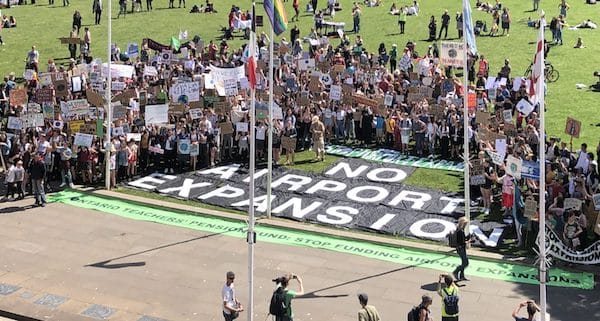In November 2023 we launched a petition asking the UK government to ban domestic flights on routes that can be travelled by train in under 4.5 hours.
The petition text is as follows:
Follow France’s lead and remove air routes where there is a direct rail link of 4.5 hours or less, to help rapidly bring emissions down in line with the UK’s legally-binding net zero targets.
With rail emissions approx 13 times lower than air, removing the option to fly would make a significant impact on greenhouse gas emissions.
At a time when we need to do all we can to cut carbon, we should follow the lead of France and Spain who have banned, or are considering banning, domestic routes where rail provides a viable alternative.
The 4.5 hour cut-off includes Lon-Edinburgh and Lon-Glasgow, two of the UK’s most-used flight routes, where journey times are comparable with rail.
After six months, the petition closed with 10,584 signatures, meaning it had reached the threshold for a government response.
The response focused almost entirely on the government’s Jet Zero strategy, which was disappointing but not surprising.
Here is our analysis:
They say:
Domestic aviation is vital for the economy, connectivity, and jobs. Our Jet Zero Strategy focuses on the development of decarbonisation technologies in a way that maintains these benefits.
We say:
Green transportation would provide more jobs (analysis by Possible). With similar journey times by rail and by air, there would be no negative impact on the economy and connectivity.
They say:
The French law applies to short-haul internal flights where the same journey could be made by train in under 2.5 hours. If the UK were to align with this pledge the only current domestic aviation routes that would be captured are between London and Manchester and Exeter. These routes carried less than 1% of domestic aviation passengers in 2019.
We say:
We’re asking for 4.5 hours in order to include more routes. Direct comparisons show that air and rail travel on London-Edin/Glas routes are similar in time and convenience to flying. Switching from plane to train would save 1.75 million tonnes CO2annually.
The French policy was pared down from a more ambitious ask, and though the carbon savings are negligible, it shows a willingness to act on the climate and it’s a step in the right direction. It’s a policy that can be expanded once it’s shown to be effective.
The 4.5 hr policy would include Lon-Manchester (2hr 6min), Exeter, Newcastle (2hr 48min), Glasgow and Edinburgh, and Edinburgh-Birmingham (4hr 13min)/Glasgow-Birmingham (4hr 9min).
They say:
We agree that it is critical aviation helps deliver net zero and we are working to decarbonise UK aviation as a whole. In July 2022, we published our Jet Zero Strategy setting out the Government’s approach to achieving net zero 2050, or ‘Jet Zero’, for UK aviation.
We say:
Jet Zero won’t be effective in reducing emissions from aviation. The sustainability of SAF is in question. New technology is still in development and won’t be commercially available for several years. Efficiency savings have historically been outweighed by rising demand. Offsetting has been proven to be ineffective.
They say:
Our analysis in the strategy shows UK aviation can achieve Jet Zero by 2050 by focusing on new fuels and technology, with knock-on economic and social benefits, and without needing to limit demand.
We say:
It is dangerous and foolish to ignore the advice of the government’s scientific advisors that demand management must come into the equation. All the independent analysis recommends that we must bring flight levels down.
They say:
Our approach is based on the guiding principles of international leadership, recognising aviation is a global sector requiring global solutions; delivering in partnership, working with industry and academia; and maximising the opportunities, such as the jobs, growth and innovation, that decarbonisation can bring.
These overarching principles are supported by six core policy measures:
-
System efficiencies: improving the efficiency of our existing aviation system, including our airports, airspace, and the aircraft we use.
We say: system efficiencies are wiped out by increases in demand.
-
Sustainable aviation fuels (SAF): building a thriving UK SAF industry, bringing UK innovations to the commercial market, supporting thousands of green jobs, and supporting the UK’s fuel security.
We say: with the sustainability claims of SAF in doubt, the SAF industry can't claim to provide green jobs.
-
Zero emission flight: developing in the UK and bringing into service novel exciting, forms of aircraft that offer the potential for zero carbon tailpipe emissions.
We say: zero carbon tailpipe aircraft will require huge levels of renewable energy, which will be diverted from other, more energy-efficient and potentially more vital sectors (e.g. road transport, housing and food). Current airport expansion plans are for fossil-fuelled planes. All industry talk is about SAF. Prototypes are so far away as to not realistically reduce emissions by 2050. We are tied into our current models for years if not decades.
-
Markets and removals: creating successful carbon markets and investing in greenhouse gas removals to abate residual emissions in 2050.
We say: carbon removals are a hugely expensive and inefficient way to deal with carbon emissions, compared to not producing them in the first place.
-
Influencing consumers: preserving the ability for people to fly whilst supporting consumers to make sustainable aviation travel choices.
We say: sustainable aviation travel choices is a false concept, when emissions savings between airlines are negligible, especially next to the potential emissions savings from switching from plane to train (90+%). Suggesting that consumers can make sustainable aviation travel choices is misleading and will lead people to think they are making sustainable choices when they are not.
-
Addressing non-CO2: working closely with academia and industry to better understand the science and potential mitigations of non-CO2 impacts.
We say: this is very important, so it's good that this is being looked at.
They say:
The Government is committed to ambitious action across all of these measures that will contribute to decarbonising the whole UK sector, with examples including:
-
A CO2 emissions reduction trajectory that sees UK aviation emissions peak in 2019 and has residual emissions in 2050 comparable to the Climate Change Committee’s Balanced Net Zero pathway for aviation.
We say: this would suggest that aviation emissions are already going down, but that's not the case.
-
A target for airport operations in England to be zero emission by 2040, with a call for evidence published in 2023, and the Government response published shortly.
We say: this is greenwash – airport operations pales in comparison to the emissions from the flights themselves.
-
Our work on airspace modernisation enables aircraft to fly more precise routes, as well as operating more efficiently when arriving / departing airports. Our deployment of Free Route Airspace over the southwest of England has already saved 12,000+ tonnes of CO2/year and 150,000 nautical miles of flying, the equivalent of seven trips around the world.
We say: insignificant, when UK aviation is responsible for many megatonnes CO2 per year.
- Our world leading SAF programme, driving demand with a mandate for at least 10% of UK jet fuel to come from sustainable sources by 2030; kickstarting a UK SAF industry with £135 million of support to SAF projects through our Advanced Fuel Fund, and building long term supply through our commitment to design and implement a revenue certainty mechanism to support UK SAF production.
-
Investment in research and development for new low and zero-carbon emission aircraft technologies though the Aerospace Technology Institute (ATI) Programme. The Programme will receive £685m of government funding between 2022 and 2025, and a further £975m between 2025 and 2030.
We say: these are both examples of using tax payers’ money so a small number of people can carry on flying.
- The launch in October 2023 of a multi-year, multi-million pound research programme on the nnn-CO2 impacts of aviation, which will include both industry and academic led projects to better understand the complete environmental impact of aviation, and the technological and policy mitigations required to address it.
-
Domestic aviation accounts for around 5% of UK aviation emissions, and through the Jet Zero Strategy, the Government has set a target for UK domestic aviation to reach net zero by 2040, ten years ahead of the economy-wide target.
We say: UK aviation emissions are closer to 10%.
- Emissions from domestic aviation are also capped as part of the UK Emissions Trading Scheme (ETS) and we have recently tightened the cap on the UK ETS to further drive down emissions and keep us on track to achieve net zero 2050.
-
The UK the Government is also continuing to invest in building new rail infrastructure by delivering HS2 between Euston in central London and the West Midlands as planned. HS2 is now well into the build and construction phase, with around 350 active construction sites and high-speed services remain on track to commence between 2029 and 2033.
We say: this is a disappointing nod to the rail aspect of the question, dedicating just one point to rail, and the rest to air travel policy.




